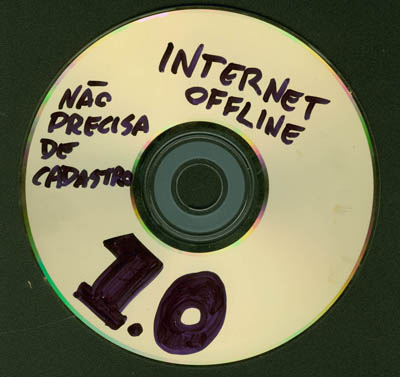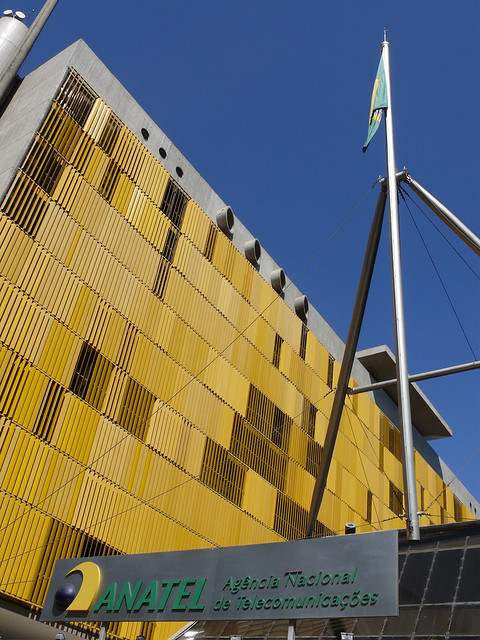On January 27 , Anatel (Brazil's National Telecommunications Agency), the regulatory agency responsible for regulating, executing and supervising the telecommunications sector, seized equipment and fined an internet user R$ 3,000 (approximately $ 1,810 USD) for sharing his wifi connection with neighbors in the city of Teresina, Piauí state (Northeast of Brazil). [GV note: one of the poorest states in Brazil.]
The first website to run the story was 180º graus (180 degrees) [pt], that stated:
A prática é corriqueira de muitos usuários de Internet via wireless não só em Teresina, mas no Brasil e no mundo inteiro. Ocorre que, de algum modo, o fato chegou ao conhecimento de fiscais da ANATEL, que, em uma “visita” à residência do proprietário da linha telefônica, apreendeu computador, modem e roteador lá instalados, lavrando auto de infração e aplicando multa de R$ 3 mil, sob a acusação de que o mesmo estaria prestando serviços de provedor de acesso à internet sem a devida autorização da Agência.
Henrique Parra, writing for the blog Trezentos (Three hundred), criticizes [pt] how ANATEL interprets the law:
Tal interpretação da lei, se generalizada, destruirá infinitas possibilidades de uso, compartilhamento e acesso à internet. Ora, ao contratar o serviço de acesso à internet eu pago uma franquia de uso (velocidade e volume de tráfego de dados). A maneira como eu a utilizo não é objeto claramente definido: se quero ser solidário e deixo minha internet aberta para que outras pessoas sem acesso à um serviço pago (caro e de baixa qualidade) possam utilizá-la qual o problema?
And concludes, making comparisons:
Aplicado o mesmo entendimento ao mundo físico seria o equivalente a criminalizar o dono do bar que disponibilizou a mesa (comida e bebida) para que bandidos organizassem um assalto. Ou então, multar as empresas de telefonia que permitiram que suas linhas telefônicas fossem utilizadas para ações ilegais.
A Voz do Além (The Voice from Beyond), writing for the blog Nerds Somos Nozes (Nerds ‘R [n]U[t]S), criticizes [pt] the way ANATEL works:
[A ANATEL] É basicamente um canal de defesa da população contra uma possível tirania corporativa. Mas a realidade se mostra bem diferente do que está no papel.
He points out a few reasons why he defends the practice of sharing internet connections:
Analisemos o caso sob dois outros aspectos: 1) a qualidade do serviço prestado no Brasil e 2) a relação dele com outros exemplos possíveis. Vá até o Google e faça uma pesquisa por Brasil banda larga. Notícias como Banda larga no Brasil é cara, lenta e restrita, avalia Idec; Banda larga no Brasil é cara e ruim, entenda; Banda larga no Brasil é uma das piores do mundo; Brasil tem a quinta pior banda larga do mundo, etc; logo aparecem. Então, para início de conversa, o tal serviço que a Anatel defende é de ruim pra péssimo. […] No ranking dos dez mais do Reclame Aqui, SEIS empresas são de telefonia/internet. NESSE índice do Procon-SP […], das dez mais, quatro são de telefonia.
Em outras palavras, podemos concluir – um pouco apressadamente, é verdade – que além da qualidade técnica da banda larga do Brasil ser uma das dez piores do mundo, o serviço oferecido ainda é péssimo e leva a milhares de usuários a reclamarem.
Let's analyze the case by two aspects: 1) the quality of service in Brazil and 2) it's relationship with other possible examples. Go to Google and search for Brasil banda larga [Brazil broadband]. News such as Broadband in Brazil is expensive, slow and limited, evaluates Idec; Broadband in Brazil is expensive and bad, understand it; Broadband in Brazil is one of the worst in the world; Brazil has the fifth worst broadband in the world, etc; soon appear. So to begin the conversation, the service that ANATEL defends is bad to awful. […] In the rankings of the top ten most cited in Reclame Aqui [Complain Here, a website that gathers complaints – GV note], SIX companies are telephone/internet ones. IN THIS Procon-SP [Consumer Protection service – GV note] Index […], of the top ten, four are telephone companies.
In other words, we can conclude – somewhat hastily, it's true – that beyond the technical quality of broadband in Brazil to be one of the ten worst in the world, our service still awful, bringing thousands of users to complain about it.
Eduardo Niedarauer regrets [pt] the episode:
É triste ver uma situação destas, que demonstra o absoluto despreparo de alguns fiscais investidos de grandes atribuições, mas sem grande comprometimento com a função.
According to a comment by Vanat on the blog Nerds Somos Nozes (Nerds ‘R [n]U[t]S) [pt], Brazilian legislation [pdf, pt] does not consider sharing of connections to be a crime, given that an internet service provider should charge for its services to be considered as such, which is not the case.
In the same direction, Bruno Maeda asks [pt]:
E por acaso a ANATEL multa ou dá autorizações à cafés, bares, restaurantes e hotéis que fazem uma infraestrutura de rede para seus clientes? Isso não é prover uma conexão, logo, categorizar-se como um provedor?
Alexandre Hannud Abdo adds [pt]:
Mais uma demonstração de que a ANATEL está aí para proteger o lucro abusivo das operadoras e não o bom funcionamento da Internet.
To this news, one could add the fear that the netizens have experienced with ANATEL's attempt [pt] to monitor phone calls of Brazilians without the need for a warrant. Claudio Colnago, on his blog, rebate, considers the measure illegal because “although it is commendable that ANATEL wishes to fulfill its duty to supervise the phone operators, it cannot do so at the expense of fundamental rights of citizens. “

"O Brasil não entendeu a Internet" – Internet offline, não precisa de cadastro (Brazil didn't understand the Internet. Internet offline, no need to register). Photo by Flickr user cinco555 shared under a CC 2.0 license
On Twitter, reactions [to the wifi sharing fine] were similar: anger, disbelief and the sense of being cheated.
Wilson Cunha Junior and Ulisses Furquim complain * [pt]:
@wilsoncjunior: O estado brasileiro ainda não entendeu pra que é que serve. Tira de alguns pobres o que deveria dar a todos. http://migre.me/3LZ7E
@ulissesf: #anatel #fail total. Não existe mais bom senso nesse país.
@wilsoncjunior: The Brazilian state has not understood yet what it's for. It takes from some poor people what it should be giving to everyone. http://migre.me/3LZ7E
@ulissesf: #anatel Total #fail. There's no longer any common sense in this country.
Leo Dias jokes [pt], while, ironically, Eduardo Macan asks [pt]:
@Leo_Dias: Bem, eu ia convidar vcs pra tomar café cmg mas vai q a agência nacional dos päes de queijo me multa p compartilhar meu café da manhã #anatel
RT @eduardomacan Meu filho e minha namorada não moram comigo e usam meu #wifi. Serei multado? :P http://zapt.in/fi0 #ANATEL
@Leo_Dias:Well, I was going to invite you guys to have breakfast with me but imagine if the national agency of cheese breads fines me for sharing my breakfast #anatel
RT @eduardomacan My son and my girlfriend don't live with me and they use my #wifi. Will I be penalized? :P http://zapt.in/fi0 #ANATEL
Bruno Ayres gives an idea [pt]:
@Bayres: E se todos nós liberássemos o acesso aos nossos routers? http://bit.ly/iimYop #tiraasenha #desobedeça #anatel
Well Zenji questions [pt] ANATEL:
@wzol: #Anatel multa usuarios que compartilham acesso a internet com equip. radio frequencia, pq ao inves disso eles nao barateiam o valor da banda
And Bernardo Cotrim finds it [pt] bizarre:
RT @bernardocotrim Eu pago a banda larga; compro um roteador; ESCOLHO não bloquear a rede. A #Anatel pode me ferrar? BIZARRO…
Finally, Cecília Tanaka, Douglas Arruda and Gilson Pôrto Jr [all pt] question ANATEL about digital inclusion:
@cecilia_tanaka: Atitude horrível da #Anatel em tempos de inclusão digital. Deveria facilitar o acesso aos usuários c/ valores + acessíveis e – burocracia.
@douglasarruda: Ao invés de a #Anatel ficar multando moradores que compartilham internet, deveriam diminuir burocracia e impostos pra baratear o acesso.
@gilporto: @andrelemos @andredeak Lamentável é pouco. Vergonhoso acho mais apropriado a posição da #Anatel, principalmente quando defende-se a inclusão
@douglasarruda: Instead of #Anatel fining residents who share the Internet, they should reduce bureaucracy and taxes to lower the price of access.
@gilporto: @andrelemos @andredeak To say unfortunate is not enough. I think shameful works better to describe #Anatel's position, especially when one defends inclusion








7 comments
Revoking this fine ought to be a no-brainer, but it remains to be seen whether whoever pulled ANATEL’s strings will be punished for this abuse of power. The regional ANATEL manager himself, quoted on 180graus (http://www.180graus.com/geral/anatel-multa-usuarios-por-compartilhar-internet-wirelless-397787.html) said:
> O Serviço de Comunicação Multimídia – SCM está restrito aos limites de uma mesma edificação ou propriedade móvel ou imóvel, *exceto* quando *envolver* o uso de *radiofreqüência*
in English
> Multimedia Communication Service (the formal name for Internet connection services) is limited to a single building or property, *except* when it *involves* the use of *radiofrequency*
(emphasis is mine)
WiFi obviously uses radiofrequency, at frequencies that don’t require a license, so the use was perfectly legal AFAICT, but IANAL.
A related point that is probably worth mentioning is that authoriterrorists and bankers have been pushing for legislation to prohibit WiFi hotspots that permit connection without positive identifications. We’ve so far managed to repeal the various bills to this effect, except for a few cities that passed laws to mandate positive dentification at LAN houses and cybercafes. http://fsfla.org/anuncio/2008-07-brasil-autoriterrorismo.en.html